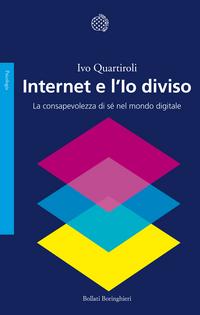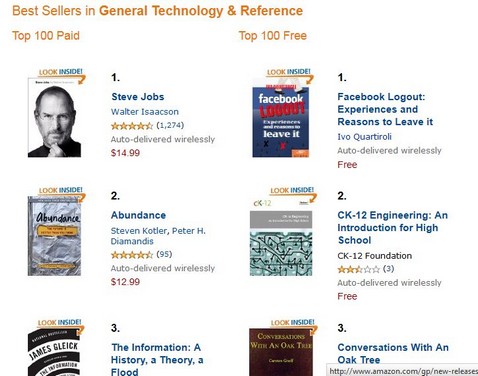 Internet e l’Io diviso. La consapevolezza di sé nel mondo digitale è disponibile in libreria. Di nuovo, un grazie a Stefano Mauri, Michele Luzzatto, Bernardo Parrella e ai collaboratori di Bollati-Boringhieri che hanno reso possibile l’edizione Italiana.
Internet e l’Io diviso. La consapevolezza di sé nel mondo digitale è disponibile in libreria. Di nuovo, un grazie a Stefano Mauri, Michele Luzzatto, Bernardo Parrella e ai collaboratori di Bollati-Boringhieri che hanno reso possibile l’edizione Italiana.
Introduzione
Come accade a molti al giorno d’oggi, sia la mia vita personale che quella professionale sono permeate di tecnologia. Ho pubblicato da editore il primo libro su Internet in Italia. Gestisco un due blog e una rivista web, curo i miei investimenti e faccio shopping online; uso Skype e la posta elettronica per le interviste, e mi sono persino concesso diverse sedute di sesso virtuale. Ora mi trovo in Asia impegnato nella stesura di questo libro, zeppo di riferimenti ad articoli web, blog e materiale reperibile solo su Internet, con l’auto di vari collaboratori online: un redattore e curatore in California, un revisore in India, un designer in Italia, un servizio stampa e distribuzione in diverse città statunitensi. La mia vita è immersa nell’oceano digitale.
Seguo da vicino il mondo dell’information technology da quando ero studente. Mentre imparavo a meditare e a esplorare i percorsi di conoscenza spirituale, sono poi entrato in contatto con la realtà interiore e ho scoperto un’altra dimensione oltre a quella della mente. Così oggi mi trovo a passare continuamente dall’elaborazione della consapevolezza a quella dell’informazione. Se all’inizio il mio interesse riguardava ciò che possiamo fare con la tecnologia, ora mi premono gli effetti della tecnologia su di noi. E da esploratore di prima mano, ho avuto modo di osservare da vicino le sottili conseguenze del nostro uso pervasivo della Rete.
Proprio come un ricercatore spirituale riesce a trascendere i confini della mente solo dopo averla osservata e compresa a fondo, per andare al di là delle trappole del mondo digitale bisogna prima conoscerlo, usarlo attivamente e comprenderne appieno gli effetti. Poiché oggi la tecnologia digitale è pervasiva, dobbiamo imparare a padroneggiarla senza perderci al suo interno, adoperandone gli strumenti in piena consapevolezza.
In questo periodo storico, la nostra mente è bombardata da stimoli, perciò diventa indispensabile trovare un equilibrio. La cultura contemporanea non riconosce nulla al di là della mente, mentre in altre tradizioni il mondo mentale è solo uno degli aspetti della nostra interezza. In occidente la priorità spetta a una sorta di «pensiero puro» cartesiano. Pur essendo indubbiamente l’organo cognitivo più riconosciuto come tale, la mente non è certo l’unico. Sono stati individuati dei sistemi nervosi sia nel cuore che nell’addome, mentre la consapevolezza globale raggiunta da chi si dedica alla ricerca spirituale è pervasiva e non localizzata. Tuttavia, queste facoltà percettive, non prestandosi a una rappresentazione digitale, vengono spesso relegate ai margini.
La nostra società tecnologica sembra opporsi all’attenzione cosciente continuata. Diversi studiosi hanno documentato gli effetti dell’information technology sulla concentrazione, sull’apprendimento e sulle capacità intellettuali. L’information technology interferisce anche con gli spazi di silenzio indispensabili per osservare le nostre trasformazioni interiori. La tecnologia ha indebolito la nostra capacità di auto-comprensione, trasformandoci, a nostra insaputa, in veri servomeccanismi. La tendenza a ridurre la gamma delle qualità umane per privilegiare solo quelle che si prestano a rappresentazioni e utilizzi in modalità digitale affonda le sue origini nella natura propria della mente-ego – in particolare nella storia occidentale, che ha generato, e poi avvalorato, le rappresentazioni mentali della realtà. Il mio intento qui è comprendere come mai la mente si lasci ammaliare da questi strumenti, fino al punto di dimenticare la persona che li usa.
Siamo convinti che l’uso dei social network e dei blog conferisca potere personale e politico. Ma in realtà, i nostri «contenuti generati dagli utenti» nutrono la macchina e divengono ghiotto materiale per qualche pubblicitario senza scrupoli che poi sfrutterà al meglio quel che andiamo dicendo su Twitter, Facebook e finanche nelle nostre email.
È necessario un passaggio dall’informazione alla comprensione del Sé se vogliamo riconquistare la libertà autentica, affrancandoci dai condizionamenti della mente e dalla manipolazione dell’informazione, indipendentemente dal fatto che sia stata generata da noi stessi o da fonti esterne. Confondiamo la libertà con la trasmissione di gigabyte di dati.
Sembra che la nostra società, così tecnologicamente sofisticata, sia poco disposta ad accettare le dimensione interiore, spirituale e metafisica della vita. In altre parole, non vale la pena esplorare quanto non può essere quantificato – che di conseguenza risulta «non oggettivo». Ancora più fortemente negata appare l’ipotesi di un possibile impatto della tecnologia sulla psiche. I tecnofili sostengono che questa sia solo uno strumento, come se la psiche possa rimanere immune dalla continua interazione con i media digitali, e come se fosse possibile tenerne sotto controllo l’impatto. Certo, siamo in grado di controllarne gli effetti, ma solo dopo aver approfondito proprio quelle modalità cognitive che i media digitali non sono in grado di raggiungere.
Per essere immuni ai media digitali occorre una consapevolezza vicina a quella del Buddha, basata su attenzione costante, presenza mentale e introspezione. Ma proprio queste doti, le vere armi contro l’automatismo mentale, diventano difficili da sviluppare se accettiamo di essere bombardati da informazioni – per lo più effimere e vuote, nonché prive di contesto narrativo. Solo la consapevolezza può dare significato e profondità ai contenuti, ma per amplificarla dobbiamo svuotare la mente. Prendiamo la storia del professore universitario che si recò da un maestro Zen per apprenderne i princìpi. Durante il loro incontro, venne servito del tè. Impugnata la teiera, il maestro continuò a versare, anche quando la tazza era ormai colma. La mente del professore, proprio come la tazza straripante di tè, era zeppa di concetti e convinzioni: andava prima svuotata per comprendere lo Zen. Lo stesso vale per il mondo digitale.
Ovunque nel mondo, quando usiamo Internet facciamo click sulle stesse icone, usiamo le solite abbreviazioni per email e chat, adoperiamo identiche modalità su Facebook. Una vera e propria globalizzazione delle menti. A prescindere dai contenuti, nel processo di digitalizzazione della realtà utilizziamo gli stessi canali mentali limitati, e interagiamo con strumenti identici. Affrontiamo il lavoro, la vita sentimentale, lo shopping, le amicizie, l’attrazione sessuale e la ricerca scientifica con atteggiamenti, gesti e meccanismi analoghi. Un’uniformità che svilisce gran parte di queste attività. Tutto viene percepito come un sistema informativo – dalla digitalizzazione del territorio (Google Earth e software di realtà aumentata) alla biologia umana.
Nella cultura giudaico-cristiana l’essere umano è padrone di natura e materia. Può manipolarle a piacimento, alla ricerca del Buono, nella speranza di riconquistare la perfezione del Paradiso perduto. Questa cultura, che considera i miracoli come una prova dell’esistenza di Dio, ha creato delle tecnologie che hanno qualcosa di prodigioso e di divino. Ci sentiamo obbligati ad accogliere ogni nuovo strumento tecnologico come un segno di pace, progresso, prosperità e comprensione reciproca.
Basti pensare a telegrafo, telefono, radio, TV e agli altri media, salutati come manifestazioni di democrazia, pace mondiale, tolleranza e libertà d’espressione. E Internet non è che l’ultimo di questi promettenti messia. Eppure non possiamo certo dire di aver conquistato una maggiore democrazia, anzi: i mezzi di comunicazione di massa e le grandi aziende sono diventati finanche più potenti, mentre la contempo la libertà di espressione si è arresa al controllo delle grandi corporation e delle agenzie governative. Al pari della TV, Internet regalerà intrattenimento a un pubblico che, isolato nelle proprie case, sarà incapace di mettere in dubbio il sistema. In una società in pieno degrado economico e ambientale, Internet potrebbe già essersi imposta come il nuovo Soma, l’oppio di ultima generazione. Tuttavia, visti gli enormi interessi economici in ballo, criticarne gli effetti sembra quasi una bestemmia.
Questi prodigi tecnologici sembrano offrire una risposta a bisogni psicologici e persino spirituali, come il desiderio di conoscenza (basti pensare ai motori di ricerca) o di comunicare con nostri simili (tramite i social network e i siti di incontri romantici). La tecnologia digitale si è già impadronita della ricerca della verità e dell’amore, due dei motori più potenti dell’essere umano. Ma una volta trasferiti questi bisogni primordiali solo a livello mentale, tramite l’informazione, l’anima rimane vuota, assetata di valori autentici; la mente diventa irrequieta, tormentata da una costante e inappagabile sete di informazione.
Il bisogno di amplificare le nostre facoltà con la tecnologia viene dalla consapevolezza di dover recuperare il senso di pace, di appagamento e di intensa percezione della realtà, smarriti lungo il cammino dello sviluppo psichico. Le tecnologie dell’informazione soddisfano inoltre la nostra atavica sete di potere e di controllo.
La mente-ego è costantemente impegnata dal flusso ininterrotto di contenuti, e monopolizza tutta la nostra attenzione. E l’information technology è indubbiamente il «pusher» mentale più potente mai esistito, in grado di alimentare la dualità della mente-ego (che trova un corrispettivo simbolico nella tecnologia binaria). A differenza della televisione, dove l’intrattenimento è contenuto tra l’inizio e la fine di un programma, Internet, video game e smartphone non hanno né pause né limiti strutturali, e ci fanno perdere la nozione del tempo e del reale, travolgendoci con un fiume di informazioni in ?tempo reale”.
Rimaniamo stregati dal computer mentre questo riflette in Rete la nostra mente. Proprio come Narciso, ci lasciamo ammaliare dall’immagine riflessa, e cadiamo vittime di un circuito chiuso. Fin dai suoi albori, Internet è stata considerata una tecnologia in grado di spazzar via interi governi e organizzazioni: forse la proiezione esteriore di quanto potrebbe accaderci interiormente, la mancata integrazione della nostra psiche.
Una realtà che ci siamo costruiti da soli e una mente che ci porta fuori strada: è qui che la meditazione ci viene in soccorso. Ci riporta verso la realtà e la verità, sul sentiero della conoscenza e del controllo della mente – distogliendoci dal desiderio di dominare il computer come esternalizzazione delle nostre doti mentali. La meditazione amplifica le nostra consapevolezza e ci integra nell’altra «Rete» globale, quella fatta di consapevolezza che permea ogni cosa.
Sono favorevole a qualsiasi medium capace di espandere le capacità espressive, ma l’auto-espressione si materializza soltanto in presenza di un Sé autentico, che difficilmente può essere formato relazionandosi con uno schermo.
Sono riconoscente ai miei maestri spirituali, che hanno ampliato gli orizzonti dell’anima nel mio viaggio verso la consapevolezza – soprattutto l’intensità di Osho e la brillante chiarezza di A. H. Almaas Ringrazio infine i miei amici (troppi per elencarli tutti) per le innumerevoli conversazioni tese a integrare cuore e intelletto nel condividere la passione per la verità.
Indice
Capitolo 1. Dalla consapevolezza della tecnologia alla tecnologia della consapevolezza
I limiti della tecnologia, 18
Ciò che non è computabile non è reale, 21
Le promesse della prima Internet, 23
Dall’elaborazione dell’informazione all’elaborazione della consapevolezza, 24
Passare tutto al tritacarne digitale, 25
La tecnologia non si discute, 26
La tecnologia ci usa, 29
Nutrire l’anima con i byte, 30
La mente immortale, 31
Amputazioni e protesi interiori tramite la tecnologia, 32
La fragilità delle convinzioni e l’information technology, 33
Capitolo 2. «È solo uno strumento»
La tecnologia è inoppugnabile, 37
Conoscere tramite il corpo, 38
La tecnologia «ci fa», 39
La tecnologia è una questione di vita o di morte, 40
Dualità binaria e dualità interiore, 41
Conoscere con il cuore, 42
L’identità con gli strumenti: dalle scimmie al chip, 45
Riconnettersi con il flusso interiore, 46
Da spettatore a testimone, 48
Buchi interiori e riempiture tecnologiche, 49
Pensiero puro senza il corpo, 52
Strumenti per la crescita interiore, 53
La mente è un medium in quanto tale, 56
L’information technology indebolisce la nostra presenza, 59
Capitolo 3. Le radici dell’information technology
Costretti a produrre, 62
L’information technology è radicata nella Bibbia, 63
La tecnologia come ritorno alla perfezione perduta, 65
Messaggi contraddittori mandano in corto circuito la psiche, 67
Figli di un Dio minore, 68
La tecnologia come salvezza finale, 69
La natura della mente, 70
Le macerie concettuali portano alla tecnologia come collante psichico, 72
La ricerca dell’immortalità, 73
Copiare, migliorare e creare nuove menti, 75
Capitolo 4. Intimità e sessualità
L’eros e la sessualizzazione della società, 79
Il cybersesso, 81
La trasformazione della seduzione e delle relazioni interpersonali, 81
Masturbazione e “sex toys”, 82
Orgasmo 2.0, 85
Le cybervergini, 87
Questioni di genere e virilità in pericolo, 90
L’esposizione prematura alla pornografia, 91
Cybersesso come esperienza tantrica, 92
Capitolo 5. Beni di consumo e commercializzazione
Sostituire il reale, 96
iMarket, 97
Il mondo nuovo, 99
Capitolo 6. Politica, partecipazione e controllo
I manovratori della nostra psiche, 103
Governi e controllo, 104
Pubblicità e attenzione, 106
La questione della privacy, 106
WikiLeaks, 111
Invadere la nostra identità digitale, 111
L’attivismo da salotto, 114
Il geek e lo yogi, 116
Capitolo 7. Tutti insieme: l’ascesa dei social network
Rinunciare al mondo, 118
Il bisogno interiore di contatti umani e Facebook, 120
Fare esperienze per mostrarle agli altri, 121
L’empatia, 122
Contatto illusorio, 125
Capitolo 8. Ragazzi digitali
Lo sviluppo del Corpo/Mente durante l’infanzia, 126
L’infanzia negata, 128
Computer e istruzione, 129
L’assenza di mentori, 130
Bambini e computer, 131
Bambini insonni, 134
Capitolo 9. Alfabetizzazione e mente analitica
Capacità analitiche e critiche, 139
Una nuova alfabetizzazione tramite gli e-book?, 141
La «tecnologia» della lettura, 143
La scrittura digitale, 144
La comunicazione e la trasformazione della coscienza, 146
Capitolo 10. Persi nella corrente
Dammi attenzione!, 149
Il fascino delle novità e della diretta infinita, 151
La gratificazione immediata, 152
Mutamenti neurologici e gratificazione istantanea, 154
L’accettazione del vuoto e l’effetto eureka, 155
Rimanere nel giro, 157
Cogitus interruptus a causa del multitasking, 159
L’assenza di storia, narrazione e passato, 162
La dipendenza, 164
Capitolo 11. L’Io digitale diviso
L’attenzione, 171
La costruzione del Sé, 172
Sviluppo tecnologico come metafora di quello psicologico, 177
L’attaccamento alla macchina, 180
L’esigenza di rispecchiarsi negli altri, 181
Il castello di sabbia si smonta: verso una personalità schizoide, 182
L’altro come immagine e il tribalismo globale, 186
La mente stessa è un medium, 189
La fine dell’identità, 191
Capitolo 12. Il processo della conoscenza
Il regno dell’oggettività, 195
Unificare la conoscenza esterna con quella interiore, 198
Lo stato di non conoscenza, 202
Possiamo conoscere con il cervello?, 206
Capitolo 13. Dalla tecnologia al paradiso in terra
La creazione della coscienza, 210
Tecnologia a supporto dell’ego, 213
La tecnologia ci fa dimenticare chi siamo, 216
Sparire nella tecnologia, 219
Poteri spirituali tramite la tecnologia, 220
Siamo forse delle macchine?, 221
La volontà di creare mondi mentali, 224
Capitolo 14. Mordere il serpente
Uscire dal giro, 228
Schermi e meditazione a confronto, 230
La meditazione, 234
L’information technology si contrappone alla meditazione, 236
La tecnologia diventa un ulteriore velo di Maya, 238
Bibliografia




